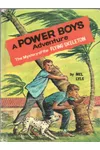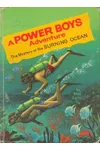Picture a mysterious scribe crafting thrilling tales for young adventurers—meet Mel Lyle, the enigmatic pseudonym behind the beloved Power Boys mystery series! In the 1960s, Lyle’s stories of teenage sleuths Jack and Chip Power captivated pre-teen readers, blending action, suspense, and a dash of youthful mischief. Though the true identity of Mel Lyle remains shrouded in secrecy, their legacy as a master of juvenile mysteries endures, sparking curiosity and inspiring young detectives.
Published by Whitman Publishing, the Power Boys series offered a fresh take on the classic mystery genre, with a modern twist that resonated with kids. Lyle’s tales weren’t just about solving crimes—they were about adventure, family, and the thrill of discovery, all wrapped in a light, engaging tone that kept readers hooked.
The Making of Mel Lyle
Little is known about the person—or people—behind the Mel Lyle pseudonym, adding an air of intrigue to their story. In the 1960s, Whitman Publishing often used pen names to maintain consistency across series, and Lyle was no exception. Some speculate that multiple authors contributed to the Power Boys books, as Whitman’s practice allowed different writers to share a single byline to avoid jarring young readers with stylistic shifts. A 1964 Chicago Tribune article hinted at this, noting that authors like Lyle or Julie Campbell sometimes represented collaborative efforts, though Whitman kept details under wraps to preserve the magic for fans.
Whoever Mel Lyle was, they were likely influenced by the era’s booming demand for children’s mystery series, like The Hardy Boys and Nancy Drew. Lyle’s ability to craft fast-paced, relatable stories suggests a keen understanding of young readers’ imaginations, possibly honed through experience in publishing or writing for juvenile audiences.
Mel Lyle’s Unforgettable Stories
The Power Boys series, spanning six novels from 1964 to 1967, follows brothers Jack (17) and Chip (15) Power, who, alongside their Dalmatian, Blaze, solve mysteries while traveling with their photojournalist father, Thomas. Each book whisks readers to vibrant settings, from the hurricane-swept Florida Keys to the scuba-diving paradise of Bermuda. The series kicked off with The Mystery of the Haunted Skyscraper (1964), where the boys tackle poltergeists and construction conspiracies in New York City, setting the tone for their thrilling escapades.
The Mystery of the Flying Skeleton (1964) sees the brothers unraveling a developer’s scheme involving ancient bones amid an impending hurricane, while The Mystery of the Burning Ocean (1965) dives into Caribbean adventures with a sunken treasure hunt. The Mystery of the Million-Dollar Penny (1965) takes them to the Ozarks, blending rural charm with high-stakes intrigue. Lyle’s style is action-packed yet accessible, with a playful tone that captures the brothers’ sibling banter and impulsive heroism. Though some critics noted less polish compared to The Hardy Boys, fans loved the realistic sibling dynamics and the series’ relentless pace.
Illustrated by Raymond Burns, the books’ vivid, single-color line art complemented Lyle’s storytelling, bringing each mystery to life. While the series may have drawn inspiration from other Whitman titles, as speculated in a 1986 The Armchair Detective article, Lyle’s knack for crafting memorable settings and clever plots made the Power Boys stand out.
Why Mel Lyle Matters
Mel Lyle’s Power Boys series left an indelible mark on children’s literature, offering young readers a gateway to the thrill of mystery-solving. The books’ blend of adventure and relatability resonated with pre-teens, encouraging imagination and problem-solving. Collectors still cherish the series, with reviews in publications like Yellowback Library and Susabella Passengers and Friends praising its nostalgic charm. Lyle’s work, though brief, contributed to the golden age of juvenile mysteries, inspiring a generation to embrace curiosity and courage.
Despite the mystery surrounding Lyle’s identity, their impact endures through the enduring appeal of Jack and Chip’s adventures. The pseudonym itself has become a symbol of the era’s collaborative storytelling, where the story mattered more than the name on the cover.
Ready to uncover the magic of Mel Lyle? Snag The Mystery of the Haunted Skyscraper and dive into the Power Boys’ thrilling world of mystery and adventure!




